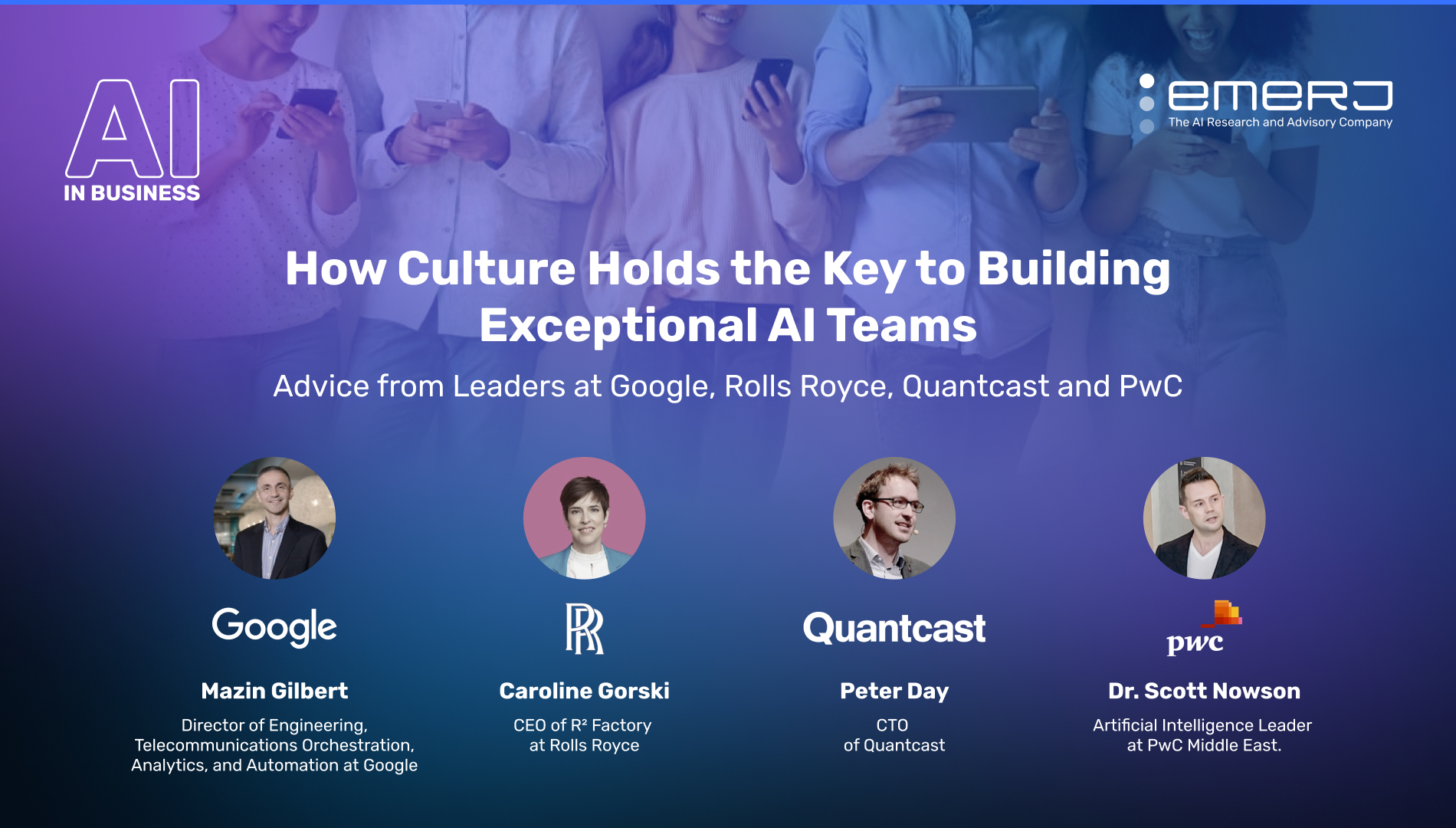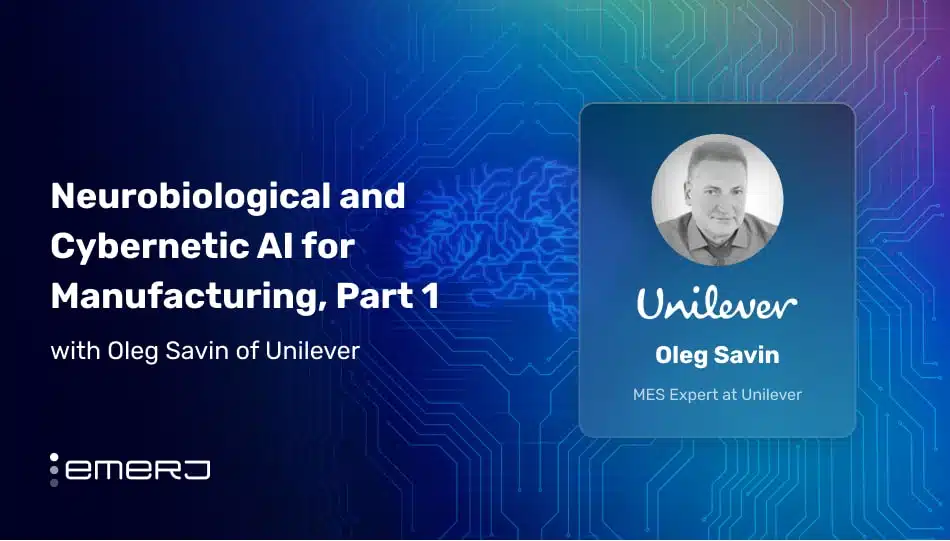In today’s rapidly evolving world, pursuing AI excellence has become a top priority for organizations across industries. However, the path to building exceptional AI teams is not solely paved with technical expertise and cutting-edge algorithms. The true key to unlocking the full potential of AI lies in ensuring that the teams leading the charge in enterprise digital transformations are working cohesively.
An organizational culture oriented toward data fluency sets the foundation for creating an environment where talented individuals can thrive and contribute their unique perspectives, holding the key to building winning and exceptional AI teams.
This article will explore the valuable insights shared by leaders who appeared on AI in Business Podcast for the special AI Team Success series. Throughout the series, these leaders shed indispensable light on the cultural practices and strategies that drive success in organization-wide digital transformations.
In the following analysis of their conversation, we examine the following key insights:
- Harnessing top talent and prioritizing data: Capturing the best talent with data science and software engineering expertise, assessing organizational needs, and valuing data are critical to building successful AI teams.
- Cultivating an identity and engaging data scientists: Providing a distinct identity, challenging problems, fostering teamwork, and promoting a culture of learning are crucial for hiring and retaining exceptional data science talent.
- Visionary leadership and data access: A passionate and innovative leader and access to relevant data are essential for making a meaningful impact with AI teams.
- Elements of success in building effective AI teams: Clear purpose, cross-functional skills, defined problems, and measurable progress are necessary for building effective AI teams.
Getting Culture and Talent Right – with Mazin Gilbert of Google
Guest: Mazin Gilbert, Director of Engineering, Telecommunications Orchestration, Analytics, and Automation, Google
Expertise: Analytics and AI automation solutions
Brief Recognition: Mazin Gilbert is a technology executive with extensive experience in data analytics, automation, open source and software delivery across multiple disciplines, including artificial intelligence, mobile and digital transformation, network and access solutions, and service operation. He earned his Ph.D. in Electrical and Electronic Engineering and an MBA for Executives from the Wharton Business School.
Mazin Gilbert speaks at length on how to hire the right talent for a successful AI team. He tells Emerj that it’s essential to actively pursue top data science and software engineering candidates to build a successful AI team. However, it’s not just about talented individuals.
He describes a common problem that companies face when implementing AI projects. Usually, companies prioritize solving customer problems and improving customer experiences. However, they often need help and realize that the process is expensive, time-consuming, and leads to poor customer experiences.
AI projects expected to take a few months took years and involved a larger team than initially anticipated. When companies realize they can’t scale their approach, they reorganize their structure to address the problem.
To address this, he suggests that companies proactively assess their organization and business needs before starting AI projects instead of going through this backward process. Gilbert emphasizes the importance of having the proper structure to deliver AI solutions effectively. He also recommends forming a small cross-functional team with a shared goal of solving customer problems:
“Top talent doesn’t have to come from Ivy League schools; it exists everywhere. And it’s not really about paying them the highest salary. They are educated and have a passion for AI and automation. But what really is most important about that talent is that from an employer, you want to train them, invest in them. And you want to give them the hardest problems and give them space to go and solve that problem.
And in the AI space, talent loves data. So if you want to attract AI talent, you must be in the data business. If you don’t treat data as your first-class citizen, you won’t be able to attract top talent for your AI team.”
– Mazin Gilbert, Director of Engineering, Telecommunications Orchestration, Analytics, and Automation, Google.
Cultivating an Innovation Culture for AI – with Caroline Gorski of Rolls-Royce
Guest: Caroline Gorski, CEO- of R² Factory, a division of Rolls Royce
Expertise: AI- applications, IoT, and data innovation
Brief Recognition: Caroline Gorski is a technology leader with more than 25 years of experience, with a background in strategy consulting, market development, and commercial decision-making. She was also the Group Director of R² Data Labs- the data innovation and artificial intelligence catalyst inside Rolls-Royce till April 2023. Caroline has an MA from Oxford University.
Gorski believes that giving the data science community its identity helps to hire and retain great talent to build winning teams.
She tells Emerj that the data science community is primarily interested in the quality of the problems they will solve on the job and the opportunity to explore rather than being motivated solely by well-known brand names or corporate perks such as holiday packages, pension schemes, or healthcare benefits. While those benefits are essential, Gorski does not think perks are the primary reason data scientists choose their jobs.
To deeply engage with high-quality problems, Caroline asserts that a sense of team, belonging, and diverse perspectives is necessary. Data scientists should be able to approach problems with curiosity and question why things work the way they do. They should be able to analyze data, seek evidence, and identify patterns.
She likens this ethos to a “license to do things differently,” emphasizing its importance in encouraging innovation:
“Traditional businesses need to articulate what your value proposition is not to the employee but to the world: Why is a person coming to help you solve your problems, answer your questions? Why is that actually going to make a difference in the world?
In the case of Rolls Royce, that’s relatively straightforward. So when I talk to data scientists about coming to look at problems that Rolls Royce is interested in engaging with, I’m saying, ‘Help us move one of the hardest to decarbonize industries to a net zero position.'”
– Caroline Gorski, CEO- R2 Factory, a division of Rolls Royce
However brilliant, data talent often has shorter attention spans than the average corporate employee. Caroline advises considering this aspect when hiring data scientists and expecting them to have long-term careers within the organization.
Most data scientists know the high demand for their skills, so if an employer can maintain a working relationship with them for three to five years, it is considered an outstanding achievement. To foster such a mutually beneficial relationship, it is crucial for the employer to consistently present data scientists with high-quality and engaging problems to work on.
Lastly, she feels the team should foster a culture of iterations, failures, and learning and development. The leaders must create a safe psychological space for the team to fail and learn from their mistakes without hiding them.
Connecting Work to Meaning – with Dr. Scott Nowson of PwC
Guest: Dr. Scott Nowson, Artificial Intelligence Leader at PwC Middle East
Expertise: Innovation Management, machine learning, natural language processing, informatics.
Brief Recognition: Before heading up AI operations for PwC in the Middle East, Scott worked for several years in AI- and analytics-centric management roles for Accenture and Xerox. Scott holds a Ph.D. in Informatics and an MSc in Cognitive Science and Natural Language from The University of Edinburgh.
Nowson sets the tone by emphasizing the importance of having a passionate and visionary leader as the starting point for building a successful AI team. This leader could be the first person explicitly hired for this role or an existing leadership team member, such as the Chief Digital Officer, Chief Innovation Officer, or Chief Technology Officer- someone with a clear vision of what they want to achieve with AI.
He further states that the leaders of AI teams need fluency in these capabilities and knowledge of the use cases, at least in their industry. Additionally, this person serves as a primary anchor to begin the team in an organization. For Nowson, he was brought into PwC via his Chief Digital Officer, and then later, Nowson took on the ‘anchor’ role.
He acknowledges the perception that top talent from prestigious institutions, like MIT, may already be employed by giant companies like Amazon. However, he suggests that this perception shouldn’t discourage organizations from seeking talented individuals passionate about solving interesting problems.
People often transition from academia to industry or change roles because they desire to solve problems that make a difference:
“If you’re like, ‘We have a lot of review data; we have a lot of contracts, we know it’s an NLP problem.’ Having some specifics, you can get someone excited about the problem and the prospects.
Knowing what sorts of roles you want is a supplement to that. It’s not just hiring the data scientists; you also need to hire the learners to have a roadmap, a data engineer, you know, an ML ops person; there’s an increasing number of roles now in AI. But ultimately, people want to come on with a sense that they will be able to impact the business.”
– Dr. Scott Nowson, Artificial Intelligence Leader at PwC Middle East
Building successful AI teams is not just about hiring great talent but also being able to retain them. Scott emphasizes giving access to the necessary data to carry out their work effectively is the primary factor in retaining talent.
Secondly, if the team sees their solutions being deployed and making a difference within the organization, it will motivate them to work. Developing great algorithms or innovative solutions is insufficient if they are being shelved.
What Does “High Performing” Mean, and How to Hire for It – with Peter Day of Quantcast
Guest: Dr. Peter Day, Chief Technology Officer at Quantcast
Expertise: Machine learning, Portfolio analytics and Genetic Programming
Brief Recognition: Dr. Peter Day has been with Quantcast for the last seven years; he began as the Director of Engineering and now heads the team as Chief Technology Officer. He did his Ph.D. in machine learning at the University of Liverpool. Dr. Day is a passionate coder and an experienced product leader.
Peter talks to us about high-performing teams and says that these teams have a clear and shared purpose. They understand the goals they are working towards and work together as a cohesive unit. This also applies to AI teams, and defining a specific purpose for the team rather than treating it as a purely abstract or research-oriented function is crucial.
He accepts that finding the right balance within an AI team can be challenging since it requires diverse skills. It is not solely about having individuals with advanced statistics or machine learning degrees. Instead, a successful AI team is a cross-functional group that can tackle ambiguous problems, employ appropriate mathematical approaches, and ensure access to relevant data and deployment technology.
While there is no strict rule to maintain a balance between experimenting and providing tangible value to the business, ensuring that the team focuses on well-defined problems that can be effectively addressed using machine learning technology can provide a strategic advantage.
Peter further suggests assembling a team that can iterate quickly on product development and brings value to customers:
“Every company needs its identity, and you need to know what you offer to this talent. I love my job. And one of the reasons I love it is because I get to solve a whole swathe of different problems. And that’s true for our talent out there.
When people come in, they can see it from day one and stick around because they know they will have a huge impact. So to me, it’s about identity.”
– Dr. Peter Day, Chief Technology Officer at Quantcast
Lastly, he focuses on setting clear metrics of success and progress. He stresses that it is only possible to iterate and improve by defining these measures. In his viewpoint, spending time shaping the problem and determining what progress looks like is essential.


















